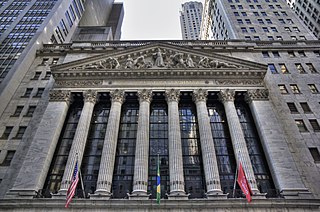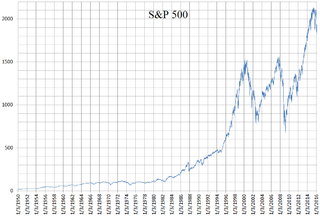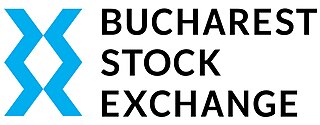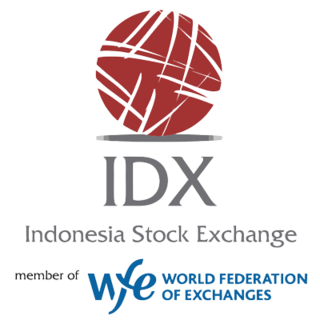
A stock exchange, securities exchange, or bourse is an exchange where stockbrokers and traders can buy and sell securities, such as shares of stock, bonds and other financial instruments. Stock exchanges may also provide facilities for the issue and redemption of such securities and instruments and capital events including the payment of income and dividends. Securities traded on a stock exchange include stock issued by listed companies, unit trusts, derivatives, pooled investment products and bonds. Stock exchanges often function as "continuous auction" markets with buyers and sellers consummating transactions via open outcry at a central location such as the floor of the exchange or by using an electronic trading platform.
An index fund is a mutual fund or exchange-traded fund (ETF) designed to follow certain preset rules so that it can replicate the performance ("track") of a specified basket of underlying investments. While index providers often emphasize that they are for-profit organizations, index providers have the ability to act as "reluctant regulators" when determining which companies are suitable for an index. Those rules may include tracking prominent indices like the S&P 500 or the Dow Jones Industrial Average or implementation rules, such as tax-management, tracking error minimization, large block trading or patient/flexible trading strategies that allow for greater tracking error but lower market impact costs. Index funds may also have rules that screen for social and sustainable criteria.

The Standard and Poor's 500, or simply the S&P 500, is a stock market index tracking the stock performance of 500 of the largest companies listed on stock exchanges in the United States. It is one of the most commonly followed equity indices and includes approximately 80% of the total market capitalization of U.S. public companies, with an aggregate market cap of more than $43 trillion as of January 2024.

A public company is a company whose ownership is organized via shares of stock which are intended to be freely traded on a stock exchange or in over-the-counter markets. A public company can be listed on a stock exchange, which facilitates the trade of shares, or not. In some jurisdictions, public companies over a certain size must be listed on an exchange. In most cases, public companies are private enterprises in the private sector, and "public" emphasizes their reporting and trading on the public markets.
A real estate investment trust is a company that owns, and in most cases operates, income-producing real estate. REITs own many types of commercial real estate, including office and apartment buildings, warehouses, hospitals, shopping centers, hotels and commercial forests. Some REITs engage in financing real estate.

The Tel Aviv Stock Exchange, colloquially known as The Bursa, is the only public stock exchange in Israel and a public company itself, listed on its own exchange since August 1, 2019. It is regulated by the Securities Law (1968) and is under the direct supervision of the Israel Securities Authority (ISA).
An exchange-traded fund (ETF) is a type of investment fund that is also an exchange-traded product, i.e., it is traded on stock exchanges. ETFs own financial assets such as stocks, bonds, currencies, debts, futures contracts, and/or commodities such as gold bars. The list of assets that each ETF owns, as well as their weightings, is posted on the website of the issuer daily, or quarterly in the case of active non-transparent ETFs. Many ETFs provide some level of diversification compared to owning an individual stock.
KOSDAQ is a trading board of Korea Exchange (KRX) in South Korea established in 1996. Initially set up by Korea Financial Investment Association as an independent stock market from the Korean Stock Exchange, it was benchmarked from the American counterpart, NASDAQ. KOSDAQ is an electronic stock market, just like NASDAQ. The open hours for the market are 09:00AM to 03:30PM KST.
Penny stocks are common shares of small public companies that trade for less than one dollar per share. The U.S. Securities and Exchange Commission (SEC) uses the term "Penny stock" to refer to a security, a financial instrument which represents a given financial value, issued by small public companies that trade at less than $5 per share. Penny stocks are priced over-the-counter, rather than on the trading floor. The term "penny stock" refers to shares that, prior to the SEC's classification, traded for "pennies on the dollar". In 1934, when the United States government passed the Securities Exchange Act to regulate any and all transactions of securities between parties which are "not the original issuer", the SEC at the time disclosed that equity securities which trade for less than $5 per share could not be listed on any national stock exchange or index.

B3 S.A.– Brasil, Bolsa, Balcão, formerly BM&FBOVESPA, is a stock exchange located in São Paulo, Brazil, and the second oldest of the country.

Saudi Exchange or Tadāwul is a stock exchange in Saudi Arabia. Tadāwul was formed in 2007 as a joint stock company and the sole entity authorized to act as a securities exchange in Saudi Arabia, but trading began in 1954 as an informal financial market. It continued as such with only 14 listed companies through the 1970s and began to acquire some formal status as the Saudi Company for Share Registration in 1980. It is regulated by the Capital Market Authority but has become partially self-regulating since 2018. It lists 203 publicly traded companies. As of 31 December 2020, its trading hours are 10:00AM to 3:10PM, Sunday to Thursday.

The Bucharest Stock Exchange is the stock exchange of Romania located in Bucharest. In 2023, the BVB's market capitalization increased by 52.7% to $64.9 billion. As of 2023, there were 85 companies listed on the BVB.
In finance, an investment strategy is a set of rules, behaviors or procedures, designed to guide an investor's selection of an investment portfolio. Individuals have different profit objectives, and their individual skills make different tactics and strategies appropriate. Some choices involve a tradeoff between risk and return. Most investors fall somewhere in between, accepting some risk for the expectation of higher returns. Investors frequently pick investments to hedge themselves against inflation. During periods of high inflation investments such as shares tend to perform less well in real terms.

The Colombo Stock Exchange (CSE) is the main stock exchange in Sri Lanka that utilizes an electronic trading platform. The CSE headquarters have been located at the World Trade Center (Colombo) Towers in Colombo since 1995, and it has regional branches in Kandy, Jaffna, Negombo, Matara, Kurunegala, Anuradhapura and Ratnapura. The CSE trades 296 companies representing 20 business sectors, as of 25 January 2021, with a combined market capitalization of 3,699 billion Sri Lankan rupees.

The Stock Exchange of Mauritius (SEM) ; is an organization responsible for the operation of Mauritius's primary stock exchange located at Port Louis. The SEM operates two markets: the Official Market and the Development & Enterprise Market (DEM). There are 40 companies listed on the Official Market representing a Market Capitalization of nearly US$5.3 billion, the DEM presently has 48 companies listed with a market capitalisation of nearly US$1.5 billion as at 31 July 2012. SEM is one of the leading Exchanges in Africa and a member of the World Federation of Exchanges.

The Tehran Stock Exchange (TSE) is Iran's largest stock exchange, which first opened in 1967. The TSE is based in Tehran. As of May 2023, 666 companies with a combined market capitalization of US$1.45 trillion were listed on TSE. TSE, which is a founding member of the Federation of Euro-Asian Stock Exchanges, has been one of the world's best performing stock exchanges in the years 2002 through 2013. TSE is an emerging or "frontier" market.

Indonesia Stock Exchange (IDX) is a stock exchange based in Jakarta, Indonesia. It was previously known as the Jakarta Stock Exchange (JSX) before its name changed in 2007 after merging with the Surabaya Stock Exchange (SSX). In recent years, the Indonesian Stock Exchange has seen the fastest membership growth in Asia. As of January 2024, the Indonesia Stock Exchange had 903 listed companies, and total stock investors were about 6.4 million, compared to 2.5 million at the end of 2019. Indonesia Market Capitalization accounted for 45.2% of its nominal GDP in December 2020. Founded on 30 November 2007, it is ASEAN's largest market capitalization at US$744 billion as of 15 December 2023.

The Mongolian Stock Exchange is Mongolia's sole stock exchange. It is based in Ulaanbaatar and was established in January 1991 by the decree of the Mongolian Government to privatize state-owned assets.

Stocks consist of all the shares by which ownership of a corporation or company is divided. A single share of the stock means fractional ownership of the corporation in proportion to the total number of shares. This typically entitles the shareholder (stockholder) to that fraction of the company's earnings, proceeds from liquidation of assets, or voting power, often dividing these up in proportion to the amount of money each stockholder has invested. Not all stock is necessarily equal, as certain classes of stock may be issued, for example, without voting rights, with enhanced voting rights, or with a certain priority to receive profits or liquidation proceeds before or after other classes of shareholders.

In finance, a stock index, or stock market index, is an index that measures the performance of a stock market, or of a subset of a stock market. It helps investors compare current stock price levels with past prices to calculate market performance.
















